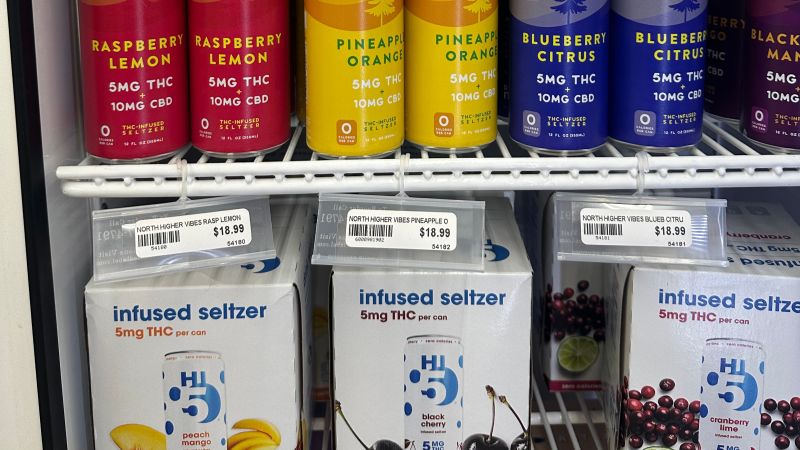In June 2023, Jon Halper, the owner of Top Ten Liquors, a chain of liquor stores in Minnesota, made waves in the beverage industry by introducing THC-infused drinks to his stores. These beverages, which contain tetrahydrocannabinol—the main psychoactive compound in cannabis—quickly became a sensation among consumers. Halper described the surge in sales as unprecedented, saying, “Immediately, the sales took off. We’ve never seen anything explosive like this.” The growth trajectory of THC beverages has been remarkable, accounting for around 15% of Top Ten Liquors’ overall sales in less than two years. Halper added, “It’s hard to believe this growth isn’t going to be astronomical.”
The rising popularity of THC drinks coincides with a cultural shift in the United States, where many individuals are adopting what’s termed “California sober” lifestyles. This lifestyle suggests a reduction in alcohol consumption due to perceived health concerns and an increase in cannabis use as an alternative. Notably, a study published in 2024 indicated that more Americans reported using cannabis daily compared to those who drink alcohol. Additionally, a significant aspect contributing to the THC beverage boom is the perceived loophole created by the 2018 Farm Bill, which allowed THC beverage manufacturers to launch their products with minimal federal oversight. In response, individual states have begun crafting their own regulations, raising questions about the future of this fast-evolving market.
Historically, beverage companies have considered adding THC to their products, but the legal complexities surrounding marijuana consumption have deterred them. As a Schedule I controlled substance in the United States, marijuana’s classification has prevented companies from accessing certain tax benefits and posed challenges in securing financing from banks. The dynamics began to shift when the 2018 Farm Bill legalized hemp production, defining hemp as cannabis containing no more than 0.3% delta-9 THC on a dry-weight basis. This legislative change opened the door for a new market: THC beverages derived from hemp that are potent enough to induce effects.
Frank Colombo, a managing director at Viridian Capital Advisors, noted that prior to the Farm Bill, the concept of hemp-derived THC beverages was virtually non-existent. He remarked, “Nobody anticipated this whole category of hemp-based intoxicants, let alone hemp-based THC drinks.” Data from Brightfield Group highlights the dramatic evolution of this market; the US market for hemp-derived THC beverages swelled from approximately $400,000 in 2020 to an estimated $571 million in 2024, with dark forecasts of expansion still unfolding.
While THC beverage makers have until now enjoyed a relative lack of stringent regulations, the necessity for governance becomes evident. Entrepreneurs in the sector are advocating for a balanced regulatory framework—one that would discourage irresponsible market practices, such as targeting minors or producing products with excessive synthetic ingredients. A reasonable level of regulation could legitimize their businesses and foster sustainable growth, yet, the response from both the industry and regulatory bodies remains uncertain.
Experts, like Hilary Bricken, an attorney specializing in cannabis and hemp industries, caution against optimism, highlighting that “it’s still going to be a bumpy road.” The path to legitimacy is fraught with challenges, as seen with Cann, a leading brand that initially sold THC beverages only in cannabis dispensaries. Co-founder and CEO Jake Bullock recounted how changes in Minnesota’s laws allowed them to explore extracting THC and CBD from hemp, leading to their product being made available in broader retail channels.
The current landscape is dotted with competitors pushing innovative products, such as hi Seltzer and BRĒZ, the latter of which infuses lion’s mane mushroom extract into its offerings. Alcohol brands are also entering the mix, as evidenced by Samantha Lee’s initiative with Choom, a citrus-flavored THC beverage that has attracted significant interest. Despite these developments, uncertainty surrounds regulatory frameworks. The Hemp Beverage Alliance is striving to establish self-regulatory principles, covering essential aspects like labeling and age restrictions, yet the call for comprehensive federal guidance persists.
As state regulations evolve, stakeholders remain apprehensive of potential federal crackdowns or adverse changes to the Farm Bill. Legal experts warn that the landscape could shift dramatically, which would greatly impact the current THC beverage market. In this climate of uncertainty, Halper from Top Ten Liquors articulated a common anxious sentiment by saying, “None of us control what is happening in Washington,” reflecting the collective concern over the future of their burgeoning industry. The potential for both growth and legal ramifications hangs delicately in the balance as the market progresses.



